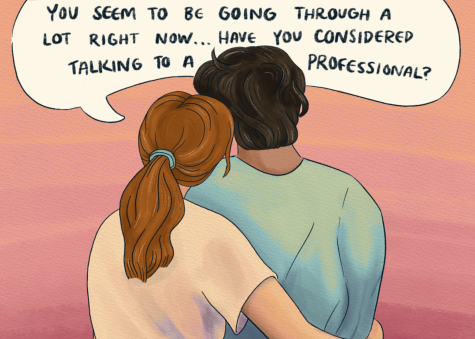Awkward: How to tell someone you’re not their therapist—but kindly
March 19, 2021

You’re in the middle of writing another midterm paper at 1:40 a.m. when your phone lights up for the third time in the last 15 minutes.
Your housemate is having another rough night and wants to talk about it again, and you really want to be there for them, but you have this paper and a worksheet due tomorrow morning. You’re not sure which to choose—your friend’s health or yours.
With any other text, you would ignore it, finish your work and get to bed, but after your housemate broke up with their partner, they haven’t been themself. You’ve been worried their self-depreciation might lead to harmful behavior.
What else can you say to them besides “I’ll be right there”? And how can you avoid this situation in the future?
The Chronicle spoke with experts in communication, etiquette, mental health and friendship to find the solution to getting your friend some professional help that you simply can’t provide.
Psychologist and friendship expert Irene S. Levine said to start with honesty. You can let your friend know that you need some allotted time for social activities, family, studies and other things.
Hollie Schmid, marriage and family therapist at Relationship Reality 312, said setting boundaries like this could also mean not answering every phone call or text right away and creating a safe amount of emotional distance, so you are not at your friend’s disposal every second.
An important component to this situation, Schmid said, is to explore how you feel when you’re taking care of your friend. Reflect on if you’re feeling burned out or tired, and be kind to yourself.
At the same time, make sure your friend knows they’re not a burden, said Bonnie Tsai, founder and director of Beyond Etiquette, a social and business etiquette consulting agency.
“You can let them know that you really appreciate how they’re so willing to be vulnerable with you, and you understand that it’s a big privilege to be able to listen to them and hear what’s going on with them with such private matters,” Tsai said.
But what do you do when this has been going on for too long, and your capacity for emotional availability is overloaded?
“You can gently say, ‘Hey I really care about you a lot as a friend or as a partner, but I also have a lot going on as well, and I’m struggling to feel like I have the emotional bandwidth to be as available as you’d like me to be. Have you considered reaching out to another friend or to a therapist? I think they may be able to help you a little bit more,’” Schmid said.
Social support should be for acute situations, like breakups or job rejections, said Sylvia Mikucki-Enyart, relationship researcher and assistant professor at the University of Iowa, but if someone repeatedly uses you as a therapist, helping them search for an actual mental health professional could be another way to support them.
She said you could tell them you love them and respect your relationship, but you have a lot going on right now as well. And, because you feel you cannot provide the support they need, speaking to a professional about their struggles would likely be healthier for them.
“We shouldn’t have to be someone’s therapist because we’re not trained to do that, and I think there’s a lot of wonderful professionals out there,” Mikucki-Enyart said.







